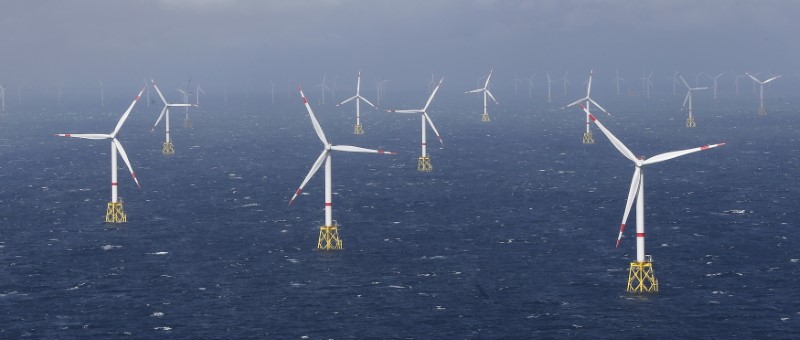
© Reuters.
By Geoffrey Smith
Investing.com — Shares in Orsted (CSE:) fell nearly 4% at the open on Thursday, unable to escape a broad selloff in European stock markets despite an increase in its full-year profit guidance.
The world’s largest operator of wind farms said it now expects earnings before interest, taxes, depreciation and amortization of between 21-23 billion Danish kroner ($275-$300 million) this year, up 1 billion from its previous forecast.
However, the improvement was due to freakish conditions in wholesale power markets this year that have led its thermal power operations – which constitute only 8% of the total – to churn out higher profits.
By contrast, EBITDA at its core portfolio of wind and solar assets fell in the first nine months of the year by 600 million kroner to 9.7 billion, despite a 40% increase in output thanks to the ramp up of Hornsea-2, the world’s largest offshore wind farm, and its growing portfolio of assets in the U.S. It also profited from the ‘farm down’ of stakes in Hornsea-2 and the Borkum Riffgrund 3 wind farm off the German North Sea coast.
The ‘farm-down’ model, also known as ‘Build-Sell-Operate’, involves the partial sale of assets developed by Orsted to long-term investors.
Delays in ramping up output at Hornsea-2, whose 165 turbines are capable of powering 1.4 million homes, caused a 2.8 billion kroner hit from over-hedging output that it didn’t ultimately generate, while other hedging issues generated another 1.2 billion kroner hit.
Orsted is one of a number of energy companies firmly in the cross-hairs of the European Commission and various national governments that are trying to avert a looming energy crisis with price caps. The Commission’s proposals to limit wholesale energy prices have been explicitly aimed at stopping windfall profits for renewables companies who are receiving much higher prices this year, even though they aren’t suffering higher input costs from their fuel purchases.
“We continue to support such initiatives, which are needed to mitigate the societal effects,” CEO Mads Nipper said in Orsted’s quarterly report. “At the same time, these initiatives impose a regulatory risk if they are implemented without taking the individual power generator’s long-term contracts and hedges into account.”
Nipper said he’s still “confident that responsible solutions will be found.”
By 04:40 ET (08:40 GMT), Orsted stock was down 3.4% in Copenhagen, the worst performer among major European energy stocks.


Be the first to comment